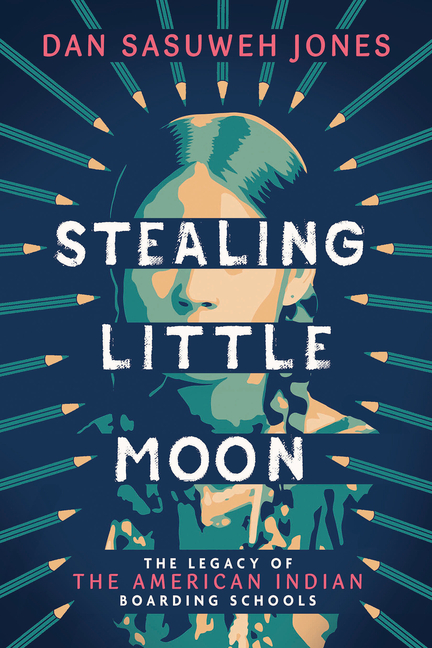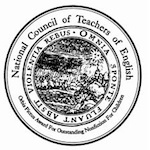
Book Resume
for Stealing Little Moon: The Legacy of the American Indian Boarding Schools by Dan SaSuWeh Jones
Professional book information and credentials for Stealing Little Moon.
5 Professional Reviews (3 Starred)
3 Book Awards
Selected for 2 State/Province Lists
See full Book Resume
on TeachingBooks
- School Library Journal:
- Grades 4 - 6
- Publisher's Weekly:
- Ages 8 - 12
- Kirkus:
- Ages 9 - 14
- Booklist:
- Grades 4 - 7
- TeachingBooks:*
- Grades 5-12
- Cultural Experience:
- American Indian
- Year Published:
- 2024
5 Subject Headings
The following 5 subject headings were determined by the U.S. Library of Congress and the Book Industry Study Group (BISAC) to reveal themes from the content of this book (Stealing Little Moon).
- JUVENILE NONFICTION / History / United States / General
- JUVENILE NONFICTION / Biography & Autobiography / Cultural, Ethnic & Regional
- Off-reservation boarding schools--United States--History--Juvenile literature
- Indians of North America--Cultural assimilation--History--Juvenile literature
- Chilocco Indian Agricultural School--History--Juvenile literature
5 Full Professional Reviews (3 Starred)
The following unabridged reviews are made available under license from their respective rights holders and publishers. Reviews may be used for educational purposes consistent with the fair use doctrine in your jurisdiction, and may not be reproduced or repurposed without permission from the rights holders.
Note: This section may include reviews for related titles (e.g., same author, series, or related edition).
From Horn Book
November 1, 2024
Jones straightforwardly chronicles the story of his family's (members of the Ponca Nation) experience in the Chilocco Indian Agricultural School in Oklahoma, one of many residential boarding schools established in the nineteenth century by the U.S. and Canadian governments to strip Indigenous children of their culture. In 1885, when she was four years old, Jones's grandmother Elizabeth (her Ponca name translates to Little Moon There Are No Stars Tonight) is forcibly taken from her home and brought to the White Eagle School; a year later school officials transfer Elizabeth to another school, Chilocco, without her family's knowledge. After graduating, Elizabeth works as a matron at the school; the author provides a poignant account of the changes her family observes in her when she finally returns home. Her daughter and granddaughter attend Chilocco -- by choice, unlike Elizabeth -- and although the author does not attend Chilocco as a student, he does maintenance work at the school before it closes in 1980. Jones deftly mixes his family history with larger Indigenous history. The varied perspectives through the years add nuance, while the book acknowledges the atrocities of the American Indian boarding schools throughout. Middle-grade and middle-school readers will gain a deeper insight into Indigenous history through this family account. An extensive bibliography is appended. Nicholl Denice Montgomery
(Copyright 2024 by The Horn Book, Incorporated, Boston. All rights reserved.)
From School Library Journal
Starred review from September 20, 2024
Gr 4-6-The Jones family was present through the entire existence of the Chilocco Indian Agricultural School, from the 1885 opening to its 1985 closing. Covering four generations of a Native Ponca Nation family, memories and accounts are recited from the family's painful boarding school legacy. Each generation had to adjust to its new life of rules, punishments, and loneliness, taken miles away from their homes. Over the course of the century, what was permissible in standards for this schooling had changed for the better with efforts led by Native advocates. With content and themes of assault and colonial violence, Jones respectfully portrays the lived and intense experience inflicted on his and so many other Native families. Embedded through the chapters are short snapshots of a mentioned key event or person, giving larger context and details. Black-and-white photographs provide a visual element, from Tribal Leaders and Heroes to Chilocco's campus over the years. With this book, readers will enhance their critical thinking skills, reflect on systemic mistreatment, develop diverse discussions, and appreciate the power of culture and family. VERDICT Detailed with emotional sympathy inherent in the retelling from a family's lineage, this narrative nonfiction title pays homage and remembrance to those harmed and intended to be forgotten.-Kaitlin Srader
Copyright 2024 School Library Journal, LLC Used with permission.
From Publisher's Weekly
Starred review from August 19, 2024
In 1885, armed federal agents stormed the Ponca reservation. Though panicked parents tried to hide their children, four-year-old Little Moon There Are No Stars Tonight was one of several Native youths taken from their families. The children were transported hundreds of miles to the Chilocco Indian Agricultural School in Oklahoma; there, they were cut off from their culture, and many given new, "American" names. Via urgent, intimate-feeling first-person prose, Jones (Living Ghosts and Mischievous Monsters), Little Moon's grandson, chronicles the history of Chilocco from its opening in 1884 to its closure in 1980. Through extensive research and interviews with key figures, the author details the goal of North American residential schools ("Kill the Indian in him, and save the man"), their strict rules, and the inhumane and traumatic conditions under which the children lived. Quotes and stories from Chilocco survivorsâ€"as well as relevant personal experiences from his childhood that Jones threads throughoutâ€"unravel heartbreaking situations and further deepen the text's visceral and empathetic depiction of this horrific chapter in U.S. history. Ages 8â€"12.
From Kirkus
August 15, 2024
Relays the heart-wrenching experiences of the American Indian boarding school era. This comprehensive and complex text by Jones (Ponca) follows four generations of his family's education at Chilocco Indian Agricultural School, starting with the experience of his grandmother. In 1885, when she was just 4, government officials stole her from her family and drove her a great distance away by wagon for boarding school. Ponca Tribe members had already been forcibly relocated from their Nebraska homelands by the U.S. government to Oklahoma. Jones explains how the boarding schools erased Native culture from students' lives to assimilate them into dominant white society. He details the cultural genocide and displacement of Native peoples, describing the poverty and other lingering effects through subsequent generations. Throughout the text, which combines general historical background with his family's story, readers learn about the abuse of and systematic attacks on American Indian people over the century that the boarding schools were in existence. The density of the information included requires some patience from readers, but Jones also offers hope, describing the revitalization of Native culture and people's ability to live in two worlds despite the U.S. government's history of legal restraints on sovereign Native nations. Text boxes provide extensive context, but their placement can distract from the flow of the narrative. Jones' truth-telling and the family experiences he weaves throughout will surely ignite a fire deep within the souls of Native youth today. Presents harsh realities and thought-provoking content critical to understanding U.S. history. (bibliography, photo credits)(Nonfiction. 9-14)
COPYRIGHT(2024) Kirkus Reviews, ALL RIGHTS RESERVED.
From Booklist
Starred review from June 1, 2024
Grades 4-7 *Starred Review* Jones' (Ponca Nation) powerful and honest memoir describes the three generations of his family that attended the Chilocco Indian Boarding school in Oklahoma. His memoir begins as he recounts an Indian agent forcibly taking away his grandmother, Elizabeth, to an American Indian school in 1884, when she was four. He reports the physical and sexual abuse that occurred at these institutions in an attempt to ""assimilate"" the youth into white society. While Chilocco prohibited physical abuse, students endured being forced to march everywhere and do hard labor. Despite this, Jones says many of his relatives who attended Chilocco excelled, and his mother even thrived, though at the cost of losing her Ponca identity. Although Jones never attended Chilocco himself, he was working there when the school closed in 1985. Readers will understand how the attempted erasure of Native American culture through Indian Boarding Schools impacted generations of family members. More than a family history, this book explains Native American history and Indigenous peoples' fight for equality. Poet Denise K. Lajimodiere (Turtle Mountain Band of Chippewa) provides a foreword. Historical black-and-white photographs (some not seen), a bibliography, acknowledgements (not seen), and author biography add to the richness of the text. A timely, heartbreaking, and ultimately hopeful memoir that powerfully illustrates the resilience and enduring spirit of the Native American people.
COPYRIGHT(2024) Booklist, ALL RIGHTS RESERVED.
3 Book Awards & Distinctions
Stealing Little Moon was recognized by committees of professional librarians and educators for the following book awards and distinctions.
2 Selections for State & Provincial Recommended Reading Lists
Stealing Little Moon was selected by educational and library professionals to be included on the following state/provincial reading lists.
United States Lists (2)
Primary Source Statement on Creating Stealing Little Moon
Dan SaSuWeh Jones on creating Stealing Little Moon:
This primary source recording with Dan SaSuWeh Jones was created to provide readers insights directly from the book's creator into the backstory and making of this book.
Listen to this recording on TeachingBooks
Citation: Jones, Dan SaSuWeh. "Meet-the-Author Recording | Stealing Little Moon." TeachingBooks, https://www.teachingbooks.net/bookResume/t/98872. Accessed 19 January, 2025.
Preview Digital Book
Explore Stealing Little Moon on Marketplace. Access requires OverDrive Marketplace login.
This Book Resume for Stealing Little Moon is compiled from TeachingBooks, a library of professional resources about children's and young adult books. This page may be shared for educational purposes and must include copyright information. Reviews are made available under license from their respective rights holders and publishers.
*Grade levels are determined by certified librarians utilizing editorial reviews and additional materials. Relevant age ranges vary depending on the learner, the setting, and the intended purpose of a book.
Retrieved from TeachingBooks on January 19, 2025. © 2001-2025 TeachingBooks.net, LLC. All rights reserved by rights holders.


 Orbis Pictus Award, 2000-2025, Winner, 2025
Orbis Pictus Award, 2000-2025, Winner, 2025
 Publishers Weekly Best Books, 2010-2024, Middle Grade Selection, 2024
Publishers Weekly Best Books, 2010-2024, Middle Grade Selection, 2024
 SLJ Best Books of the Year, 2010 - 2024, Selection, 2024
SLJ Best Books of the Year, 2010 - 2024, Selection, 2024
